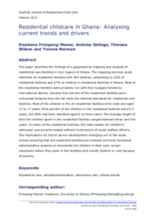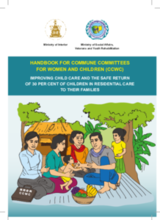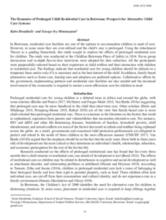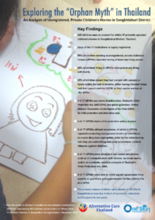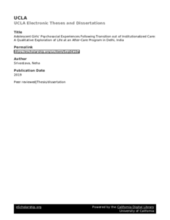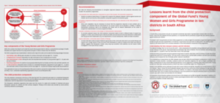Displaying 541 - 550 of 1510
Guided by social-ecological theory, this study explores responses to violence against children with disabilities, including preventative measures and treatment of victims in the West African countries of Guinea, Niger, Sierra Leone, and Togo.
This study compared adolescents in residential care (RC) in Portugal, with a Portuguese community sample on the incidence of mental health problems and psychosocial skills, explored gender differences and the relationships between mental health problems and psychosocial competencies.
This study examined the impact of the model of professional childcare in a three-year project involving fifty-three children and young people and their carers in local-authority children’s homes on two UK areas (Northern and Southern England).
The main objective of this study is to explore, from a bottom-up perspective, the moderating effect of an experienced happiness indicator (OHS) and the daily-life activities shared between caregivers and adolescents in the residential care system in Peru.
The paper describes the findings of a geographical mapping and analysis of residential care facilities in four regions of Ghana.
This handbook highlights the role commune committees for women and children (CCWCs) can play in support of implementing the Action Plan for improving child care, which is being carried out in five priority provinces in Cambodia. The Action Plan intends to safely return 30 per cent of children in residential care to their families by the end of 2018, as well as establish effective preventive and gatekeeping mechanisms to prevent unnecessary family separation. This handbook is useful in strengthening CCWCs’ roles and enhancing their knowledge and capacity to protect children in their communes.
Using the Attachment Theory as a guiding framework, this study sought to explore the effects of prolonged residential care for children.
This summary report presents key findings and recommendations from an analysis of unregistered, private children's homes in Thailand's Sangkhlaburi District.
This dissertation study aimed to describe and understand adolescent girls’ subjective experiences of life in an after-care facility after transitioning out of institutionalized care in Delhi, India.
This briefing paper reports on the lessons learnt from a process evaluation of the child protection component of the Global Fund’s Young Women and Girls (YWG) programme, a multi-pronged HIV prevention programme targeting young women and girls implemented in 10 districts in South Africa.

